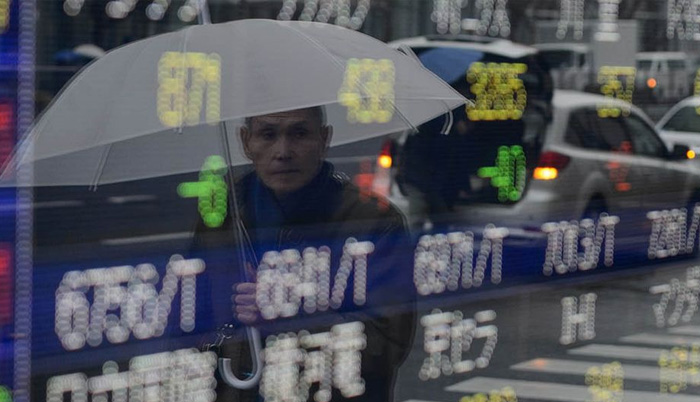![]() Home > World Business
Home > World Business
Decoupling Is Hard To Do For Japan Stocks Still Tied To The Yen

Photographer: Akio Kon/Bloomberg
![]() March 28th, 2017 | 08:45 AM |
March 28th, 2017 | 08:45 AM | ![]() 762 views
762 views
JAPAN
Japan’s stock market is again showing itself handcuffed to U.S. growth prospects and its own currency.
Ties tightened in the last week as separate selloffs exceeding 1 percent befell Topix investors for no other reason than the failure of Donald Trump’s health-care overhaul. The president’s setback heightened broader concerns about his stimulus agenda for the U.S. economy, sending the yen surging toward 110 per dollar and bringing the Topix to the brink of erasing its 2017 advance.
It’s a blow to bulls who’ve sought evidence the Topix can chart its own course, aided by Bank of Japan stimulus at a time the Federal Reserve is cutting it off. Even forecasts for earnings growth topping 17 percent haven’t been able to break the grip of the yen’s advance or U.S. economic sentiment.
“It’s been the Trump rally all along,” said Hideyuki Suzuki, a general manager at SBI Securities Co. in Tokyo. “And now with the pitfalls of his promises having surfaced, the question is where do we find the right balance?”
Japanese stocks are taking cues from the yen even as a chorus rises among analysts who think they see sufficient improvement in Japan’s domestic economy for the nation’s equities to unlock themselves from the exchange rate. Before last week, the yen and Topix were both up about 3 percent this year.
After Monday’s 1.3 percent drop, the Topix is within half a percentage point of erasing its gain for 2017. While that’s a far cry from last year’s 13 percent first-quarter rout, and the index is still up more than 109 percent since 2011, this year’s return leaves it at third-worst among 24 developed markets tracked by Bloomberg.
Investors are at a crossroads as they scramble to undo expectations over the U.S. president that had underpinned a rally in global equities since November.
Proponents of the decoupling thesis note that the bar for profit growth is lower in Japan than in America, where the S&P 500 trades for 18.1 times forecast earnings, compared with 15.6 times in the Topix.
“Investors should focus on fundamentals like the economy and corporate earnings,” said Soichiro Monji, general manager of the economic research department at Daiwa SB Investments Ltd. “Corporate profits in April could be the most important point for forecasting stock market directions in both the U.S. and Japan.”
In the run-up to those results, bellwether industries from banks to automakers are in the red when it comes to their share prices, after an optimistic start to the year -- hurt by the yen’s rally. The country’s largest lender, Mitsubishi UFJ Financial Group Inc., shed 1.7 percent on Monday to its lowest close in almost four months. A gauge of auto shares is down 8.7 percent from its 2017 peak.
“Even if the U.S. government manages to shift their focus toward tax reform, it’s unclear whether this will be accomplished given the differences in opinion within the Republican party,” said Hiroki Ihara, chief strategist at Phillip Securities Japan Ltd. in Tokyo. “It’s possible that the health-care bill has deepened divides.”
Source:
courtesy of BLOOMBERG
by Min Jeong Lee and Yuko Takeo
If you have any stories or news that you would like to share with the global online community, please feel free to share it with us by contacting us directly at [email protected]